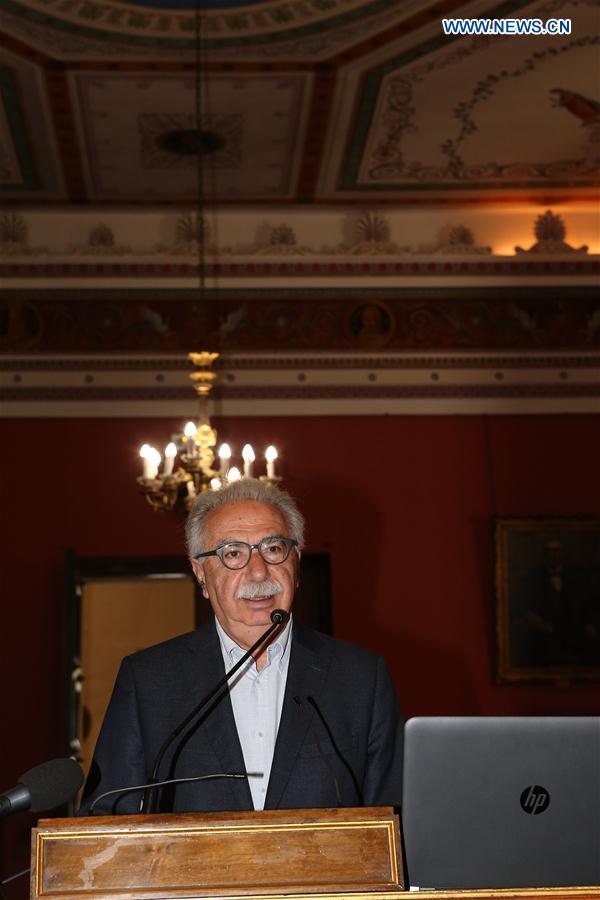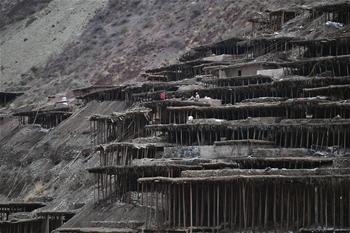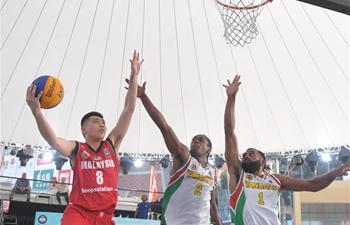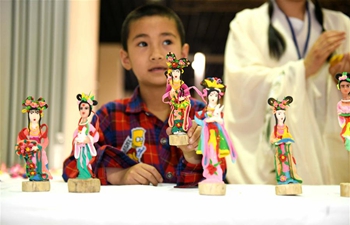
Kostas Gavroglu, Greek Minister of Education, Research and Religious Affairs, addresses a forum on Chinese-Hellenic cooperation in higher education, in Athens, Greece, on May 23, 2019. Dozens of presidents and rectors from Chinese and Greek universities attended the forum held at the National and Kapodistrian University of Athens (NKUA) on Thursday. (Xinhua/Marios Lolos)
by Maria Spiliopoulou, Yu Shuaishuai
ATHENS, May 23 (Xinhua) -- The next steps in Chinese-Hellenic cooperation in higher education were examined during a rectors' forum in Athens on Thursday, with Greek and Chinese participants expressing willingness to deepen bilateral ties in this field and help strengthen friendship between the two peoples.
Dozens of presidents and rectors from Chinese and Greek universities attended the forum held at the central building great hall of the National and Kapodistrian University of Athens (NKUA), the first Greek university.
A total of 11 cooperation agreements have been signed between Greek and Chinese universities in recent years and three more are on the way, while more and more Chinese students study in Greece and Greeks in China, Meletios-Athanasios Dimopoulos, Rector of NKUA, said when delivering a welcoming speech.
"We wish that cooperation for the exchanges of students, professors and researchers will contribute to the better communication of the unique elements of the civilizations of the two peoples and will help to strengthen the friendship between the two countries," he said.
"We hope to strengthen the pragmatic cooperation with the Greek higher education sector, expand the vision of cooperation in the Chinese education sector, and bring together the educational circles of the two sides to enhance both China's and Greece's international influence and competitiveness in education field," noted on his part Zhao Lingshan, Secretary General of the China Education Association for International Exchange (CEAIE), head of a delegation of more than 40 Chinese rectors, deans and professors.
During the forum, the two sides exchanged views on topics such as "Education, Innovation and Entrepreneurship", "Language and Civilization Teaching", "Student Mobility" and "ICT in Education".
"Today is an important day in the relationship between Greece and China. Today's meeting is a meeting which brings everyone together in order to plan their future steps," Kostas Gavroglu, Greek Minister of Education, Research and Religious Affairs, told Xinhua during the forum.
The establishment of the first undergraduate program in Archaeology, History and Ancient Greek Literature that will be taught in English at NKUA from 2020, which was announced during Thursday's forum, could also boost bilateral ties, according to the Greek official.
"We hope it will be a very successful program and I very much hope that students from China will be among the first people who will be studying in this program," Gavroglu said.
"I think it is a cooperation that both parties learn a lot," he commented on collaboration in higher education between China and Greece so far.
During Thursday's opening remarks at the forum, Zhang Qiyue, the Chinese Ambassador to Greece, referred to the cultural foundation of friendly relations between Greece and China, which was also underlined during the recent talks between the two heads of states in Beijing earlier this month.
"China and Greece are both ancient civilizations whose friendly exchanges go back a long way, and the two countries share a natural affinity," Zhang said.
"In terms of education, we share many similarities. We both have the tradition of respecting teachers and valuing education," she noted, before outlining some of the examples of ongoing Sino-Greek cooperation in higher education.
In recent years, China-Greece education exchanges and cooperation have yielded fruitful results, said the ambassador, adding that many Chinese universities have Greek language study programs and established centers for Hellenic studies, while Chinese language learning has become more and more popular in Greece with the second Confucius Institute in Greece will soon be opened in Thessaloniki in northern Greece.
"We sincerely hope that with this forum, our two sides will work together to create more highlights of China-Greece educational exchanges and cooperation, to support the development of education and people-to-people ties in our two countries, and thus make contribution to the friendly relations of our two countries," she concluded.
Greece can learn a lot and benefit enormously from closer cooperation with China in this sector, Greek Minister of Foreign Affairs George Katrougalos, also said this when addressing a welcome reception at the Chinese embassy on Wednesday night.
"Sometimes we forget about China's very significant scientific achievements. It is therefore in our interest to see our universities, which are very good, to be in contact with Chinese universities and our students and professors being able to exchange ideas," he said.
Xu Yan, an exchange student from China's Guangdong University of Foreign Studies, has been learning Greek here for the past eight months and also following some courses from NKUA's Department of Philosophy.
When asked about this experience, she told Xinhua it is very meaningful for herself in two ways: first, "by putting me into the original language environment" she can learn better Greek; second, "it enlarges my vision by coming to an ancient city with a very long history and culture to feel its cultural heritage."











